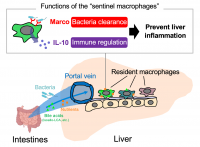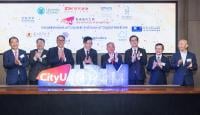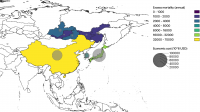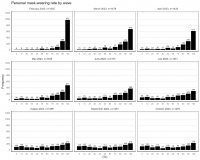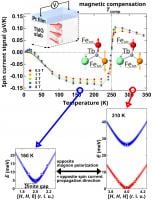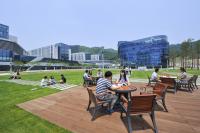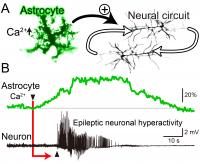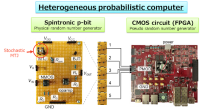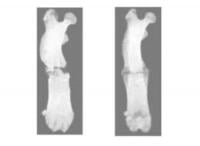Content is provided by our community of institutions, partners, researchers and journalists.
Tohoku University
26 Apr 2024
Our brains are truly miraculous. They can process vast swathes of information with very little energy supply. One of the many ways our brain may do this is through dilation of blood vessels, which enhances energy circulation and clears wasteful materials. A research team has recently developed a method that easily observes and monitors this phenomenon.
Hokkaido University
26 Apr 2024
Chemical and heat treatment of sewage sludge can recover phosphorus in a process that could help address the problem of diminishing supplies of phosphorus ores.
Lingnan University (LU)
26 Apr 2024
The launch ceremony for the Lingnan-Yuanpei STEM Summer Academy (LYSSA), jointly organised by Lingnan University and Yuanpei College (Yuanpei) of Peking University (PKU), was held recently on the Lingnan campus. Over 50 experts, project advisors and students from both universities attended in person or virtually. A hub cultivating Hong Kong’s and Beijing’s innovative and entrepreneurial talents, LYSSA encourages students from both universities to transform their creative ideas into grant-winning business plans. At the same time, they are expected to acquire liberal arts qualities and an entrepreneurial spirit.
Osaka University
25 Apr 2024
Osaka University researchers discovered liver resident macrophages' pivotal role in defending against gut bacteria and related substances entering via the portal vein, particularly under compromised intestinal barrier conditions. Identified as "sentinel macrophages," they are activated by isoallo-lithocholic acid. This finding holds promise for developing preventive and therapeutic strategies for liver chronic inflammatory diseases, such as metabolic dysfunction-associated steatohepatitis (MASH), by enhancing the function of these macrophages to mitigate inflammation and improve treatment efficacy.
City University of Hong Kong (CityU)
25 Apr 2024
Academic, clinical and industry partners signed several MoUs with City University of Hong Kong at a special ceremony on 24 April to mark the establishment of the CityUHK Institute of Digital Medicine (IDM).
Hokkaido University
24 Apr 2024
As wildfires in Siberia become more common, global climate modeling estimates significant impacts on climate, air quality, health, and economies in East Asia and across the northern hemisphere.
Tohoku University
24 Apr 2024
The enzyme PI3K plays a critical role in cell migration. Scientists have long understood this function. But researchers have recently unveiled that a subunit of this enzyme also has the ability to slam on the breaks to this process.
Osaka University
24 Apr 2024
Researchers from Osaka University examined how specific types of contextual changes, such as government recommendations and perceived behavior of others, influenced mask-wearing behavior during the COVID-19 pandemic. They found a complex relationship between societal norms and individual behavior during the pandemic, indicating that future strategies for public health crises interventions should consider various factors and contexts, including cultural predispositions.
24 Apr 2024
The recently concluded Sustainable Finance for Tiger Landscapes Conference convened tiger range countries, private and public sector donors, international development agencies, the Tiger Conservation Coalition, and other conservation organisations to discuss innovative solutions to sustainably finance tiger landscape conservation.
Tohoku University
23 Apr 2024
Researchers at Tohoku University and the Japan Atomic Energy Agency have discovered a unique property, the quantum metric, within magnetic materials, altering the 'electron universe' geometry. This distinct electric signal challenges traditional electrical conduction and could revolutionize spintronic devices.
Tohoku University
23 Apr 2024
Using neutron scattering and voltage measurements, a group of researchers have discovered that a material's magnetic properties can predict spin current changes with temperature. The finding is a major breakthrough in the field of spintronics.
Osaka Metropolitan University
23 Apr 2024
Bacteriophage therapy could be developed based on study’s results
City University of Hong Kong (CityU)
23 Apr 2024
Oxygen is vital for both human and marine life survival. A few years ago, Dr Ng Chi-on, a graduate of the Department of Chemistry at City University of Hong Kong (CityU), together with his team, developed a new type of photo-sensor that can effectively monitor oxygen concentration in seawater and reduce the monitoring cost. The team subsequently established a start-up company, called “NerOcean”. In collaboration with government departments such as the Agriculture, Fisheries and Conservation Department, NerOcean tested the sensors in five to six marine zones, aiming to develop a marine surveillance network – “Nerve of the Ocean” – in the long run upon mass production of the sensors. This is expected to result in a breakthrough in sustainable marine environment monitoring and fisheries production management.
Daegu Gyeongbuk Institute of Science and Technology (DGIST)
22 Apr 2024
- A joint research team from DGIST-UNIST has developed ultra-high-efficiency pure red light-emitting devices by modifying the surface of perovskite light-emitting layers to enhance stability and electrical properties.
- The findings have been published in the journal “Materials Today.”
Daegu Gyeongbuk Institute of Science and Technology (DGIST)
22 Apr 2024
- A joint research team between DGIST, Ewha Womans University, Incheon National University, and Sang-hoon Nam at MIT used atomic force microscopy to identify what causes electron-hole separation due to energy-level differences within and at the interface between crystals in the light-absorbing layer of thin-film solar cells
- Suggested directions to understand carrier behaviors in a variety of fields with atomic force microscopy
Osaka Metropolitan University
22 Apr 2024
Watching and waiting with minimal intervention forms educational philosophy guided by balance
Osaka University
22 Apr 2024
Researchers from Osaka University used structured light and switchable fluorescent molecules to reduce the background light from the out-of-plane regions of microscope samples. This method allowed for the acquisition of images that surpassed the conventional resolution limit, and it may be useful for further study of cell clusters and other biological systems.
Daegu Gyeongbuk Institute of Science and Technology (DGIST)
20 Apr 2024
- Three scholarship recipients were selected in multidisciplinary ICT and one in life sciences through the 25:1 competition ratio for the scholarship
Daegu Gyeongbuk Institute of Science and Technology (DGIST)
20 Apr 2024
- Launch of joint academic-industrial programs through a partnership agreement with K-Club, an association of KIST family companies, to enhance academic-industrial collaboration.
- Expectations of joint research and spread of business achievements in promising technology fields through agreement with Samick THK.
Asia Research News
19 Apr 2024
Asia Research News monitors the latest research news in Asia. Some highlights that caught our attention this week are the discovery that baby stars “sneeze”, how to increase panda reproduction and detect fiddler crab signals, and how being slightly overweight in our older years can be beneficial.
Tohoku University
19 Apr 2024
Tohoku University researchers have unveiled a new means of predicting how to synthesize new materials via the ion-exchange. Based on computer simulations, the method significantly reduces the time and energy required to explore for inorganic materials.
Tohoku University
19 Apr 2024
When epileptic patients suffer seizures, their brain is undergoing repetitive and excessive neuronal firing. But what triggers this has stumped scientists for years. Now, researchers have used fluorescence calcium sensors to track astrocytes' role in epileptic seizures, finding that that astrocyte activity starts approximately 20 seconds before the onset of epileptic neuronal hyperactivity.
Lingnan University (LU)
19 Apr 2024
Lingnan University in Hong Kong has participated in the two-day QS China Summit 2024 from 17 to 18 April in Shanghai to explore how universities can contribute to China’s global leadership in higher education. The main theme of the summit is “Remaining Distinct in Global Higher Ed: China’s Place in the New World of Education”. As part of efforts to strengthen Lingnan’s international visibility, the University hosted a President Panel Discussion titled "Fostering Distinction in Chinese Higher Education Through Digital Innovation". The Panel provided an exceptional platform for discussions on Chinese higher education within the rapidly evolving field of digital innovation.
Osaka Metropolitan University
18 Apr 2024
Skilled players show stronger inhibition processes when electing not to pass the ball
National Institute for Materials Science (NIMS)
17 Apr 2024
Electron spin states can now be probed at much higher resolution and more efficiently, opening new opportunities in materials analysis and data processing technologies.
Tohoku University
17 Apr 2024
Researchers at Tohoku University and the University of California, Santa Barbara have unveiled a probabilistic computer prototype. Manufacturable with a near-future technology, the prototype combines a complementary metal-oxide semiconductor (CMOS) circuit with a limited number of stochastic nanomagnets, creating a heterogeneous probabilistic computer.
Lingnan University (LU)
17 Apr 2024
The Department of Psychology of Lingnan University and the Department of Psychology of Renmin University of China (RUC) signed a new five-year cooperation agreement on 11 April 2024, marking the start of a fresh chapter. The agreement covers teaching exchanges, research collaboration, and professional development, and includes a sub-agreement on the Master's Degree Student Exchange Programme. The agreement will promote academic exchanges between the two departments, and further strengthen their partnership.
Osaka Metropolitan University
16 Apr 2024
Aiming to reduce fracture recovery times, an Osaka Metropolitan University-led research group is focusing on plasma irradiation as a treatment method
City University of Hong Kong (CityU)
16 Apr 2024
Algae, a kind of organism commonly found on the water surface, is a highly efficient carbon absorbent, which can capture more carbon dioxide (CO2) than trees. Alcarbo Technologies Limited (Alcarbo) is a biotechnology company incubated by the Seed Fund and Angel Fund of City University of Hong Kong (CityU)’s HK Tech 300. It cultivates microalgae using genetic mutation technology and uses its self-developed “photobioreactor system” (PBRs) and nanobubble technology to enhance the carbon capture capacity of microalgae. This allows microalgae to capture about 68 times the amount of CO2 of an equivalent area of forest, making them “Super Carbon Capture” species.
Lingnan University (LU)
16 Apr 2024
Lingnan University’s Teaching and Learning Centre held its annual “Inno-GBA: Empowering education with Generative Artificial Intelligence tools” from 16 to 19 April. The four-day event examined the latest Generative AI (GAI) tools for teaching and learning in higher education, and sophisticated state-of-the-art GAI tools to facilitate academic research and student learning, and assist jobseekers. The first day of the event, which was conducted in hybrid mode, over 200 people came to hear leading professors from the main universities in the Greater Bay Area (GBA) and industry experts from high-tech companies speak.





